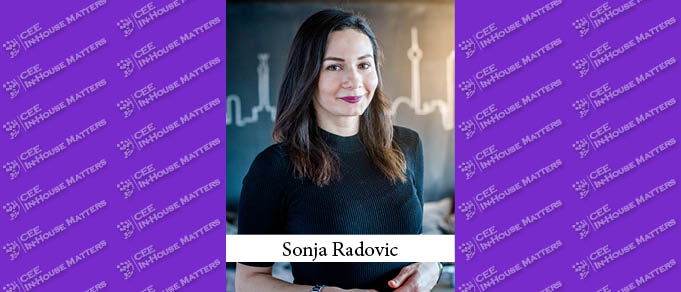On November 13, CEE In-House Matters reported that Berlin-based APX Axel Springer Porsche had appointed Serbian lawyer Sonja Radovic as its Head of Legal. We sat down with Radovic to learn more about her career path leading up to her current role.
CEEIHM: Let's start by looking at your early legal career. What law firms and which lawyers would you say played the most important roles in shaping you as a professional?
Sonja: Sometime towards the end of my law studies I already knew the law firm I wanted to work with. It was called Karanovic & Nikolic at the time – now Karanovic & Partners. As seen from the outside, it seemed really professional and it looked like working there created a lot of opportunities for young lawyers. I applied and landed the job rather soon, and started working there as a junior associate.
It was absolutely not how I imagined it – still amazing but definitely different. You learn really quickly that working in a firm like that is less about suits and shine and more about long hours in tracksuits and sneakers. That said, looking back at it, the drive that we all had as a team was amazing. It was highly stimulating, and we seemed to always be working on large transactions and looking for creative solutions to complex problems. And it makes sense that we were exposed to that. Outsourcing anything to a law firm usually means a lot of money, so nothing simple tends to be outsourced.
I spent four years with the firm and I was lucky to have some amazing mentors. The first that come to mind are Ana Lukovic and Ivan Nonkovic, who were senior associates in the firm at the time. Together with them, I worked on a lot of corporate and real estate law matters and they pretty much shaped my legal personality, with them spending quite a bit of time with me and helping me learn what I like and what I don't, and what I am good at and what I am less so.
CEEIHM: How did you end up moving to Berlin?
Sonja: I can't say I wanted to live in Berlin before my move. The city felt too crowded and too big for my taste, so it really didn't attract me that much. I decided I wanted to get a masters abroad. I signed up for a Master of Law and Business with the Bucerius Law School in Hamburg, hence the original move to Germany. The program was great as it was a combination of law and business, which was interesting for me to since it was focused on how to get things done rather than red flags and potential problems. During those studies, we also focused a lot on entrepreneurship and venture capital and it was then that I decided I wanted to have a start-up of my own eventually. That ultimate goal is what led me to Berlin – the city has a great eco-system for start-up founders.
Three years after moving to the city, the dream of setting up my company has not taken shape yet – I guess I am a bit too risk-averse and wanted to learn all about start-ups before actually creating one. I actually moved into the city to join APX – a company at its very early stages at the time because I thought it'd be an amazing experience just because of that start-up feel. Prior to that, I had worked as a lawyer catering to companies at a far more mature stage of their operations and now I was joining one that was just being founded. It was an amazing experience. As a lawyer, I was taught how to support and serve a company, and we did our best to maintain the operations of our clients, but now I had the chance to experience the mindset of actually creating one from ground zero. I got the chance to truly understand what sweat equity means and that experience was invaluable to me.
CEEIHM: Your first role with APX was as a member of the investment team. Why did you apply for that role and what was that transition like for you?
Sonja: When I first sat down with them I was honest: I don't know a lot about start-ups, but I am eager to learn and happy to roll up my sleeves and support the team. Having a legal background is absolutely a unique selling point for working in an investment team. I didn't know much about how a young company operates, sure, but as any lawyer, I had done a lot of due diligence by that point – even as a junior you end up doing some form of due diligence work once a month. That was a great starting point because I knew what to look at and what to ask for when looking at investments. Of course, real due diligence is far more comprehensive than a conversation with three fresh grads looking to start a new company, but the perspective used to look at things proved invaluable. It was fascinating to see how the experience of due diligence applied to established companies in the past helped you look at young companies and help them project how they should act towards building the foundations for the future. I got to apply the knowledge of what went wrong in some of the mature companies I looked at and I could advise new ones how not to repeat those mistakes. It was great to see how I could apply those worst-case scenarios to help direct early-stage companies shape up in the right way, to begin with.
That said, of course, there were a lot of business aspects I had not been exposed to as a standard lawyer. I wasn't asked in the past to look at P&Ls, business models, or go-to-market strategies. There was a lot I had to learn, including all the abbreviations from finance that, at times, I felt like were just thrown at me and I had to scramble to wrap my head around them.
CEEIHM: How did talks over you taking over the legal function come up? How did you feel about the prospect initially?
Sonja: I guess it was somewhat of a natural conclusion. I was the only one who actually practiced law and was already a part of the investment team. A lot of due diligence processes were carried out by me on my own by that point, and I sort of naturally built a department around me organically as I ended up covering all the funding rounds, including getting outside counsel when needed and directing them. At one point I realized I was spending as much time handling legal aspects for all teams as I was managing my own portfolio, if not more. Looking back at it, I think I naturally grew into this role because it was something that was a part of me for so long, so it was only normal to gravitate towards it.
CEEIHM: How do you feel putting your legal hat back on after a few years? Do you think you look at legal matters differently now?
Sonja: Yes, very different. The business side of things makes me understand the legal opinions in a new light. I now know that if I advise a directory of a company on a legal aspect, I need to make it as practical as possible, and I need to understand the business background well enough that I can truly understand the scope of the business he or she is managing. I feel I truly understand the actual impact of a legal opinion, of an assessment I make, and I can now tailor my messaging far better for a business person. I also think I lost a bit of my risk aversion. In my current role, I need to assess how a transaction plays out within a longer timeline – I no longer look at a transaction from start to closing only, but instead have to think about how it will impact the next funding round, what questions will come up then, how an exit strategy will be shaped by it all, and so on. All in all, I feel I am a much better lawyer now than I was before.
CEEIHM: What's on the horizon for you in 2021?
Sonja: Our portfolio is growing quite a bit, including in terms of the number of funding rounds. We had our first big exit a little while ago, so I am hoping we'll build on that and have a few series A and B rounds, as well as a few exits.
CEEIHM: Looking back at your career path to date, what, if anything, would you have liked to do differently?
Sonja: I would not change a single thing. Yes, I feel at times it was more a case of me stumbling upon most of the opportunities in my career rather than them resulting from careful planning, but I was lucky to have those opportunities and have the drive to take advantage of them. Even if I planned it all out, I don't think things would have turned out as well as I feel they did, so I can only hope I'll continue to stumble upon new opportunities.
This article was published in issue 1.2 of CEE In-House Matters. The full edition is available here in pdf format, here in e-reader format, and here in electronic format.


